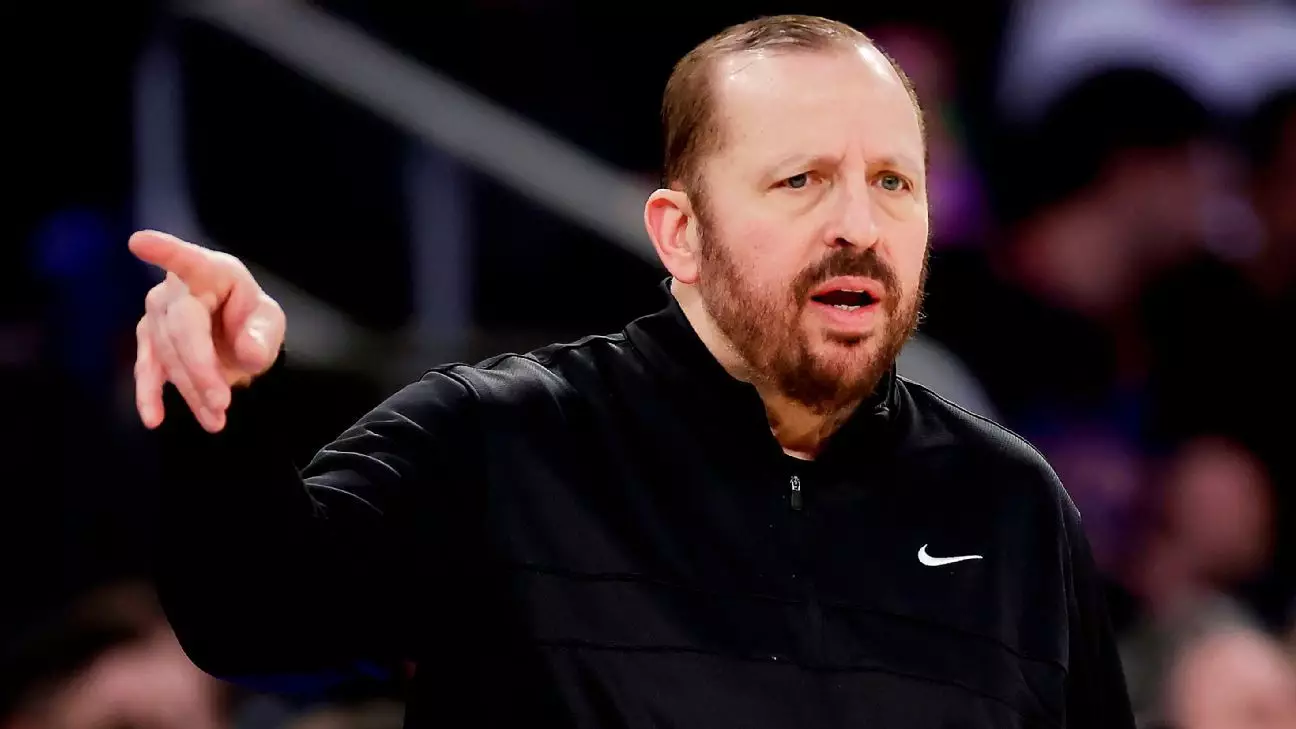The New York Knicks have sparked a whirlwind of reactions within the basketball community following their unexpected decision to terminate head coach Tom Thibodeau’s contract just days after their impressive run in the Eastern Conference finals. For a franchise that hasn’t tasted playoff success in decades, this move is both surprising and laden with implications. The Knicks made headlines this season by advancing further in the playoffs than anticipated, which raises critical questions about the organizational philosophy and their long-term vision.
Thibodeau’s dismissal was announced a brief three days after the Knicks bowed out to the Indiana Pacers, a traditional rival, in six tense games. Although many critics pointed to this early playoff exit as a failure, the truth is far more nuanced. Under Thibodeau’s direction, the team not only toppled the defending champions, the Boston Celtics, but also captured two consecutive 50-win seasons—a feat not achieved since 1995. The decision to part ways with such a successful figure speaks volumes about the expectations and ambitions within the team’s management.
The Problem of Player Dynamics
While Thibodeau undeniably ushered in a period of relative success for the Knicks, it’s crucial to examine the dynamics between coach and players, which may have contributed to his firing. The Knicks’ transformation from a beleaguered organization to a playoff contender was marked by heavy reliance on fatigue-prone starters, a hallmark of Thibodeau’s coaching style. This relentless approach might have fueled short-term victories, but lacked sustainability, particularly in a league that increasingly prioritizes load management.
Interestingly, emerging star Jalen Brunson expressed his confidence in Thibodeau, noting his belief in the coach’s capability just as rumors of his job security circulated. This highlights a disconnect—while players have remained loyal, the front office seemed fixated on chasing a championship, willing to jettison a coach who, despite his historical precedents, may not have aligned with their ultimate strategic direction. What the organization is signaling is that a historic success record isn’t enough if it does not coincide with an evolving vision.
What Lies Ahead: The Future of the Knicks
As the Knicks turn the page to a new chapter, the landscape of potential candidates to replace Thibodeau will play a critical role in shaping the team’s future. The balance of maintaining that winning momentum while integrating innovative coaching strategies is paramount. Ideally, the new coach should embrace a philosophy that resonates with both established and incoming talent, ensuring a cohesive team ethos centered on championships.
New York’s keen interest in acquiring elite talents like Karl-Anthony Towns and Mikal Bridges suggests a willingness to invest in high-impact players. The upcoming decisions will illustrate their commitment to crafting not just a competitive team but a roster capable of thriving against postseason pressures. The synergy between management decisions and on-court strategy will be crucial in determining the success of future coaching appointments.
The Weight of Legacy
Tom Thibodeau leaves behind a complex legacy in New York. Although he is the club’s most successful coach in recent decades, this success came without the ultimate trophy. His dismissal raises pressing questions around the expectations placed on coaches and their ability to adapt to the rapidly changing nature of the NBA.
Expectations from passionate Knicks fans will amplify the pressure on whoever steps into the head coach position next. While Thibodeau created a competitive atmosphere, the successor must recognize the smarter allocation of minutes and innovative offensive strategies vital to advancing through the grueling playoff landscape. The complexities of managing player fatigue and load while maintaining competitive ferocity will be central to the next coach’s strategy.
The Knicks are at a pivotal crossroads, burdened by a rich history yet yearning for a brighter future. While they’ve demonstrated glimpses of greatness, forging ahead necessitates the flexibility to grow and evolve—to not only aspire for championships but to also develop a healthier climate for players and coaching staff alike.

